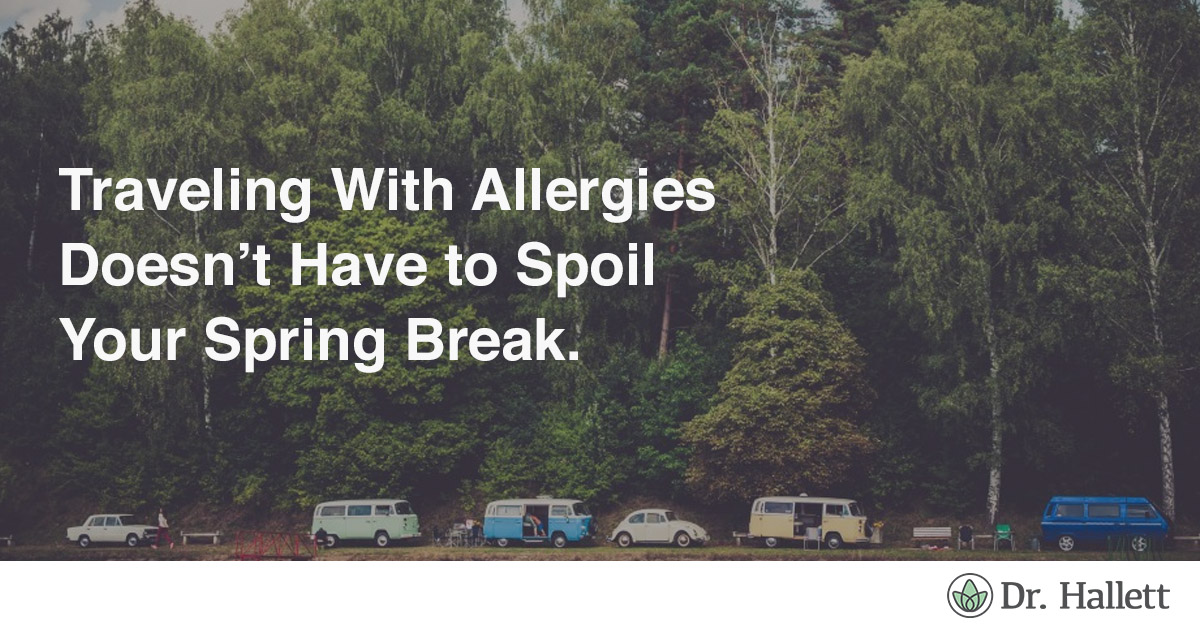
Traveling with allergies just takes some planning.
Spring Break is right around the corner and many of us are making plans for a trip to the beach, the mountains or maybe some other exotic locale. Living with allergies at home can be hard enough, but traveling with allergies raises a completely new set of challenges. As you begin to make your plans, it’s important to head out prepared. Traveling with allergies doesn’t have to be torture!
Do your allergy research before you travel.
Keeping your allergies under control while you’re on the road needs to start before you even take a step out the door. First, think about your destination. What allergens and irritants are common where you’re going? Check the pollen counts at your destination. Worldwide counts are available from the Allergy Nursing website at http://www.allergynursing.com/climate/pollen.html/. You can also search online for a local weather channel for your destination and usually find current pollen and mold counts.
Pack with your allergies in mind.
You should be allowed to check all types of allergy medication through security, but try to keep your medications in their original packaging to avoid running afoul of the Transportation Security Administration. Put liquid or gel medications in three-ounce or smaller quantities and pack them in a separate clear, quart-sized bag just like the ones you use for shampoo, perfume or colognes.
Whether you are traveling by plane, train or automobile, make sure you pack at least three days of allergy medications in your purse or carry-on bag so they can be kept with you at all times. And bring an extra day’s worth of each medication just in case you’re delayed when you return home.
If you use dust-proof, zippered pillow covers at home, pack one for the pillow at your destination. It takes up little-to-no space in your suitcase. If you will be taking a longer trip, don’t forget to pack any hypo-allergienic laundry detergents or fabric softeners that you may need.
If you have food allergies, pack your own snacks in your carry-on and avoid taking chances on airline food or with the options available in airports, rest stops or train stations. If you have serious food allergies, such as peanut allergy, be sure to carry your emergency epinephrine injector (EpiPen) with you at all times.
Allergies and airplanes.
The air that is circulated in airplanes is particularly dry, so be sure you have a saline nasal spray or gel in your carry-on bag. Use it once an hour to keep nasal passages moist. Saline sprays and gels are both available without a prescription.
All U.S. domestic flights, and most flights between the U.S. and international destinations, are smoke-free, but some airlines in other countries still allow smoking. If you’re on a flight where smoking is permitted, ask to be seated as far as possible from the smoking section, and adjust your air blower so that it blows back toward the smoking section to keep as much smoke away from you as possible.
Look for allergy-friendly hotels
More and more hotels are advertising themselves as offering asthma and/or allergy friendly rooms. Ask if your hotel offers such accommodations. These might include things such as pillow and mattress covers or hypoallergenic linens. At a minimum you should seek out a hotel that is entirely smoke-free. Hotels that do permit smoking will have “nonsmoking rooms” but very often they do not strictly enforce this policy. It’s easy to tell if previous guests have smoked in the room. Even if you’re in a smoke-free room, if it’s right above a smoking floor, you’ll end up getting exposure to the smoke that’s below you. If you are given a room that smells of smoke, ask to be moved immediately. If you have mold allergies, ask for a sunny, dry room away from the pool. Ask about the hotel’s pet policy. Hotels cannot bar service animals, but if you have animal dander allergies, you probably don’t want to be staying in a hotel that advertises itself as pet-friendly!